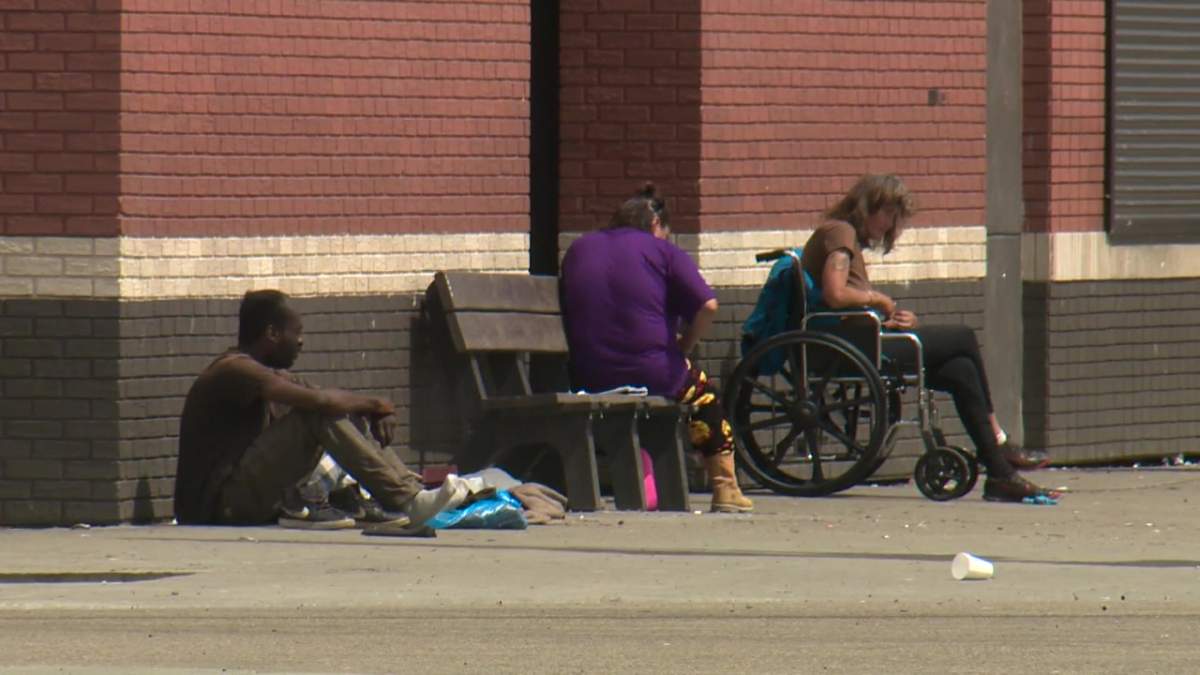An infectious disease outbreak in Edmonton’s inner city has a prominent local doctor calling for more to be done to get homeless people into stable housing.

“Shigella is an infectious disease that we see in third-world countries or after earthquakes, disasters or floods,” said Dr. Louis Francescutti, a University of Alberta public health professor and emergency physician at the Royal Alexandra Hospital and Northeast Community Health Centre.
“We’ve got third-world medical conditions in the middle of Edmonton in 2022. Totally unacceptable.”
LISTEN: Dr. Louis Francescutti speaks with Shaye Ganam, Oct. 20, 2022.
Shigella is an acute infectious disease that’s commonly associated with diarrhea, as well as fever, nausea and stomach cramps. A strain of the bacteria causes dysentery.
Alberta Health Services said it spreads when someone comes into contact with fecal matter from an infected person and also by eating food contaminated with the bacteria.
Francescutti said shigella is commonly transmitted from person to person when people don’t have access to good personal hygiene.
“So in other words, they’re not able to shower, they’re not able to go to the bathroom and wash their hands appropriately afterwards,” he said.
AHS said a cluster of shigella cases was first identified amongst the inner-city population back in August.
To date, the health authority has identified 87 cases — 64 of which required hospitalization. The first case became ill on Aug. 17. So far, AHS said no deaths have been reported.
Francescutti said infected people would typically have persistent watery and possibly bloody diarrhea that would keep them at home and close to a bathroom.
“What we’re seeing amongst a population that’s houseless right now is the inability to do those simple things,” he said.
Marliss Taylor, director of health services at Boyle Street Community Services, described the disease as being similar to a never-ending bout of food poisoning.

Get weekly health news
“Not having any place to go and no support, all of that would make it absolutely horrendous, and I think that’s what we’re seeing for some of our community members,” she said.
The disease can cause severe illness, resulting in hospitalization.
“For some of them, they’re ending up in the intensive care unit,” Francescutti said.
“Once they have the infection, their bowel lining becomes weakened and leaky and then bacterial products get into their bloodstream — so they develop septic shock.”
The disease can result in serious symptoms, Francescutti said, such as dehydration causing potassium, sodium and electrolyte imbalances that can affect heart and kidney function.
He said in the past week, he’s had four patients with dangerously low potassium levels.
“They could even lose enough blood from the bloody diarrhea that their haemoglobin is impacted. They can develop chest pain, shortness of breath. So the list goes on.”

Francescutti said he has never seen a situation like this in his 30-plus years as a physician and if the outbreak isn’t brought under control, it will get worse as we head into winter.
“It’s going to tie up an enormous amount of health-care resources at great expense when some basic public health measures could prevent this from happening.”
Taylor has been at Boyle Street for 27 years and said she has never seen a shigella outbreak.
“We have maybe moments of some food poisoning or some norovirus that may happen,” she said.
“But this ongoing outbreak is very new and very difficult.”
AHS said the majority of the cases so far are among the houseless population so the risk to the general public remains low, but Francescutti refutes that.
“Anybody can get shigella,” he said, explaining it’s as simple as touching a doorknob and then your face.
Francescutti said while most citizens who have a home and a family doctor can get the illness under control, someone who is on the street is probably also dealing with other health challenges that weaken the immune system or are mentally ill and not able to look after themselves.
“Unchecked, what could end up happening is they can end up in ICU and they can end up dying from an infectious disease in 2022 — which is crazy when you stop and think about it.”
AHS said it has reached out to physicians, inner-city shelters and partners to make them aware of the outbreak and has provided advice to getting it under control.
The health-care provider said it is leading a task force with the city, Alberta Health, Community and Social Services, Edmonton area shelters and other partner organizations to share resources and stop the spread.
But Francescutti said the real solution should involve homeless people getting off the streets and into affordable and supportive housing.
“We need to be able to give people a place where they can have a life that’s quite similar to the life that you and I have: their own bathroom, their own shower, their own ability to keep themselves clean and stop spreading this infection.”
Tim Pasma, manager of homeless programs at the Hope Mission, said the organization has been aware of the disease for a while now and is seeing spread amongst people living in homeless encampments.
His organization has been doing what it can to prevent spread inside the shelter, Pasma said, explaining the focus has been on hygiene practices and increased deep cleans of the building.
“As we see more people come inside through the winter and the higher number of congregate spaces, we’re going to want to make sure that we have everything in place to mitigate spread once people are closer together,” Pasma said.
AHS is reminding people proper hand hygiene helps to prevent the spread of many illnesses, including shigella.









Comments
Want to discuss? Please read our Commenting Policy first.